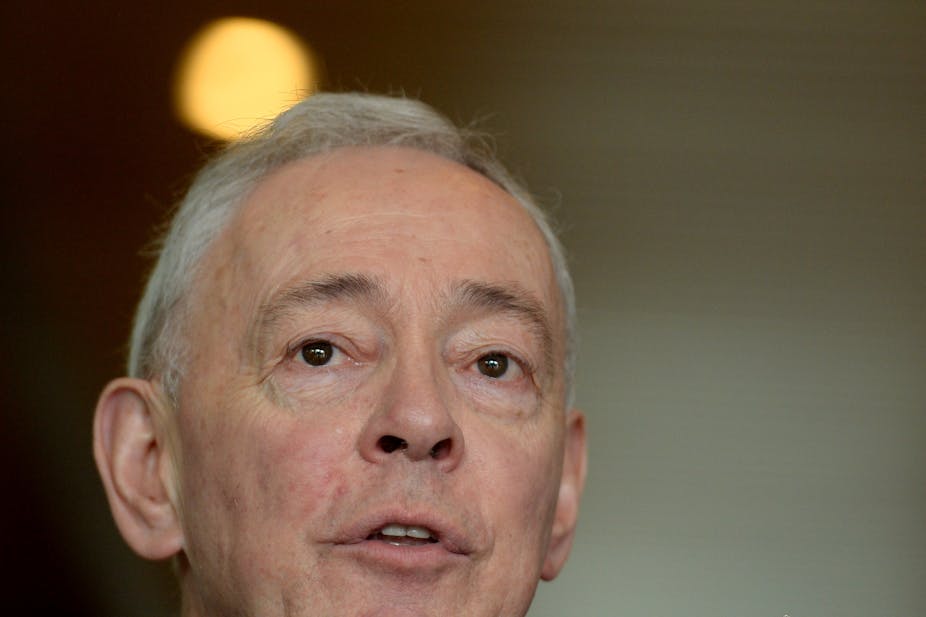Few members of the 20th-century political right were more important than Milton Friedman. As an academic, author, television presenter and adviser to Ronald Reagan – who once described his show Free to Choose as a “survival kit” for the Cold War – Friedman helped initiate the free-market revolution that swept the world in the 1980s.
For all that, there was one title Friedman would never accept: “conservative”. In his book Capitalism and Freedom, he made the observation that economic liberals weren’t there to preserve the status quo, nor maintain the “state interventions that interfere so greatly with our freedom”.
A better term, Friedman thought, was “radical”. After all, economic liberals favoured “major changes to social legislation”. Friedman even believed that, if they could practically administer them, private corporations would ideally run community parks, charging users for entry and upkeep.
Bob Day, the new Family First senator for South Australia – whose vote the Abbott government will need to pass much of its legislative agenda – is a great admirer of Friedman. Day is what we might call a “conservative libertarian”. Like Friedman, he advocates extensive economic deregulation, while at the same time supporting the preservation of families with a “natural mother, natural father”.

Before he entered parliament, Day’s economic advocacy tended to ring loudest. As Housing Industry Association president and HR Nicholls Society secretary, he conducted a one-man crusade against state intervention. Day once compared the fight against the minimum wage to the fight against slavery, likening himself to a 19th-century abolitionist. In 2005, he criticised WorkChoices for not going far enough.
Since being elected to the Senate, Day’s campaign has gained speed. In August, he made his clearest move yet, offering treasurer Joe Hockey a deal. If Hockey followed his advice on industrial relations, he would help the government pass parts of its budget.
Day argued that young people should be allowed to opt out of the Fair Work Australia system, letting them bargain away their minimum wage and benefits in exchange for a job. While it would represent a profound change to Australian industrial law, Day considered it a “silver bullet” for dealing with youth unemployment.
Even the Council of Small Business of Australia considered Day’s proposal extreme. Director Peter Strong argued:
We should have a system where you can’t accidentally take advantage of desperation.
While Day’s plan might eventually go nowhere, or be implemented only in parts, it reflects an important trend in contemporary Australian politics: the conservatives are now radicals.
If there’s momentum to upend and replace traditional institutions, it’s now coming from the political right. Universal health care, the welfare state, a regulated higher education system, the ABC and industrial relations: each in its way is part of the foundations of Australia’s social life; each is under attack by self-identifying “conservatives”.
Historian Greg Melleuish confronted this same question when defending John Howard’s conservatism after WorkChoices. He argued that economic institutions aren’t worth preserving because laws, not social conventions, uphold them:
The principles on which Australian society rest[s] … should be founded on voluntary co-operation and not state coercion.
But this argument only makes sense if we accept that these laws aren’t themselves the product of society, or the institutional expression of what people actually want. Here, political history disagrees with Melleuish.

Every time the Liberal Party has recently attempted to revolutionise Australia’s economic life, it has run into the same problem – public opinion. In 1993, then-Liberal leader John Hewson advocated ending the awards system and Medicare bulk-billing. Despite Hewson being in a supposedly “unlosable” position, Labor won a fifth straight election.
In 2007, Howard defended his government’s WorkChoices legislation, then lost both his job and his seat. Hockey’s budget has gone much the same way. An affable treasurer has been transformed in the popular imagination into a cigar-chomping fat cat.
Each of the three examples suggests that Melleuish is wrong. Economic institutions like the minimum wage and award system aren’t imposed on an unhappy public. If anything, the opposite is true. A largely content public is reluctantly forced back to the barricades, defending the institutions that shape their economic life.
The political left is waking up to the fact that it might be now on the side of tradition. You can hear it in the language of its leaders. Ged Kearney, head of the Australian Council of Trade Unions, described the budget as:
… nothing short of a savage assault on the Australian way of life and famous egalitarianism.
Opposition leader Bill Shorten has variously accused the budget of being “unfair” and “radical”.
It’s hard to reconcile the term “conservative” with these attempts to overturn and remodel traditional institutions. But when it comes to economic policy, preservation has never really been the goal. As Margaret Thatcher put it back in 1981:
Economics are the method: the object is to change the soul.
Editor’s note: Shaun will be on hand for an Author Q&A session between 3 and 4pm today (September 3). Post any questions about conservative politics and radicals in Australia in the comments below.

